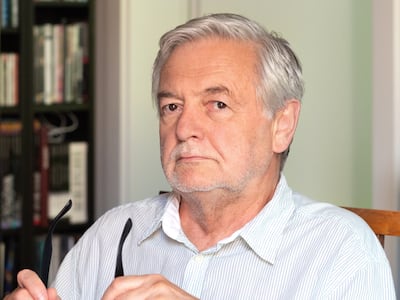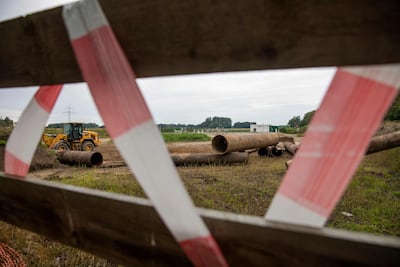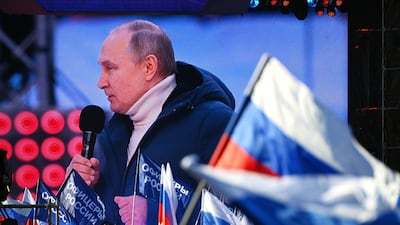Poland’s former ambassador to Kyiv has told The National that the Ukraine war had already led to fundamental change in European “security architecture” with as yet unseen implications that will play out over months and years.
The invasion had destroyed all sense of “comfort” in Poland and the Baltic states, as well as Sweden and in Finland, which will now likely apply for Nato membership.
As Poland’s ambassador to Ukraine from 2016 to 2019, Jan Pieklo met President Volodymyr Zelenskyy when he was an upstart candidate and then later as president.
“I was very sceptical at the very beginning, as his level of knowledge of international politics was very low indeed. But his performance now is just excellent. Vladimir Putin has transformed Zelenskyy from a Russian-speaking post-Soviet comic to an international leader who had created a strong patriotic feeling for his country. It's unbelievable.”

The greatest potential change flagged by Mr Pieklo was the potential for the Russian Federation to follow former Yugoslavia with states breaking away from Moscow, disillusioned by the corrupt regime led by President Vladimir Putin.
Mr Pieklo said France and Germany had been weakened by their handling of Russia policy both historically and in reaction to events.
Speaking in Krakow, Poland, Mr Pieklo stated that with his war aims failing in the initial weeks of the conflict, Mr Putin’s position was “weaker and weaker every day”, with the increasing threat of being toppled from power an express danger.
“He's in desperate place,” he said. “He arrested some of his top security officers and generals and they are not very happy. We can see the potential for a change of regime and I don't believe that after this it will be possible to form a strong regime in Russia.”
This could result in a battle between Mr Putin’s “security clan” and those wishing to topple them. “The final result of this fight would be the disintegration of Russia as a state,” he said.
Having witnessed the break-up of Yugoslavia, Mr Pieklo believes that the situation was a similar in Russia.
There are several territories in the south and Far East that could break away — including Russia's Caucasus regions, Tatarstan, Bashkiria, Yakutia, Kamchatka, Buryatia and Siberia — Mr Pieklo said.
“There is a potential for separatism particularly in Siberia region as these lands were also conquered by Russia,” he added. “Siberia has a long history of not being very friendly towards Moscow. But Siberia is the most important source of income for Russia with gas, oil and metals so it will be a disaster.”
Areas Russia has annexed in Ukraine and Georgia could also become self-governing or return to their original states, he said.
Mr Pieklo suggested that unlike former Yugoslavia, the territories would not “fight with each other but they will just not like each other”.

The impact of a divided Russia would have significant geopolitical consequences. “It would be dangerous for the world but ultimately it will be the best solution for Russia itself, for Ukraine and for the security of the region,” said the veteran diplomat, who is now an advisor to MEP Witold Waszczykowski, deputy head of the foreign affairs committee.
Russia’s failure would also have a significant impact on China, making it “behave in a more humble way, trying to find consensus with the West”.
For Germany the termination of the Nord Stream Two gas pipeline was “a disaster” as the “whole concept” of building a new German economy was based on the deal.
“For them this is the end of the story and it will be very difficult for Germany but they should not have a feeling of guilt because it was a false deal.”
Mr Pieklo argued that the West was still trying to comprehend the results of “this geopolitical earthquake” but the situation would continue to remain unclear “because we don't know what will happen in Russia”.
Inevitably the war would lead to a “dramatic change of the security architecture which we were used to”.



































